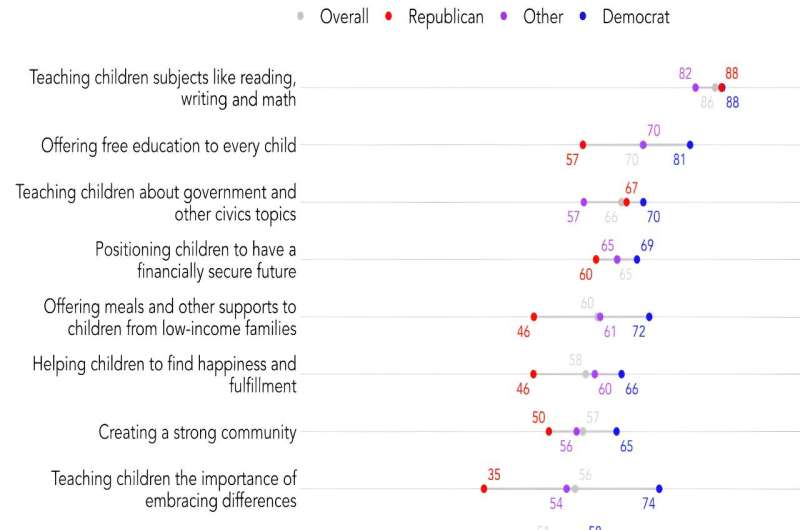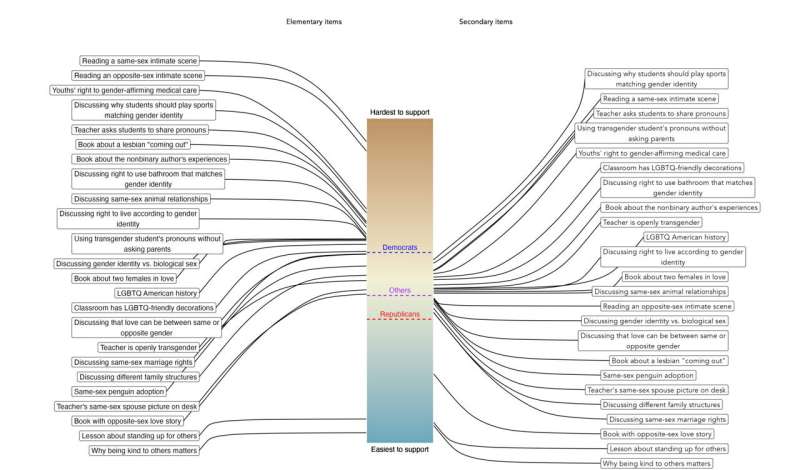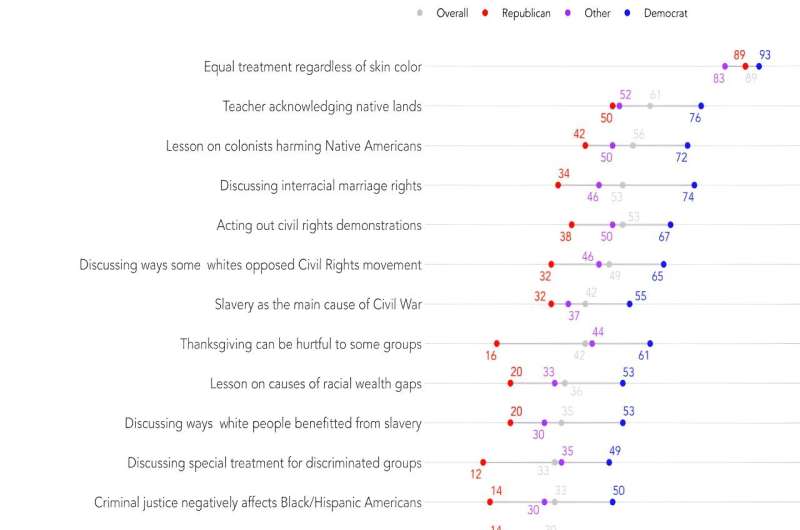This article has been reviewed according to Science X's editorial process and policies. Editors have highlighted the following attributes while ensuring the content's credibility:
fact-checked
trusted source
proofread
How Americans really feel about the teaching of controversial topics in schools

While Americans overwhelmingly agree on the fundamental value of public education, a new study by researchers at USC reveals deep partisan divides on sensitive topics like LGBTQ+ inclusion and racial justice in K-12 curricula.
Drawing from a nationally representative survey of more than 3,900 U.S. adults, the study offers a more nuanced picture of public opinion than the heated debates dominating headlines. The research also provides insights for policymakers and educators navigating the complexities of public education in an increasingly polarized America.
"We were surprised and hopeful to find such strong bipartisan support for public education and its purpose," said Anna Saavedra, co-author of the study, research scientist and co-director at the Center for Applied Research in Education at the USC Dornsife College of Letters, Arts and Sciences.
"That said, there are major partisan differences in beliefs about what children should be learning in public schools, particularly regarding topics related to LGBTQ and race. Local districts have the challenge of reconciling these differences in the coming years," said Saavedra, who is also the director of research for the USC EdPolicy Hub based at the USC Rossier School of Education.
The researchers conducted an internet-based survey from September to October, targeting a nationally representative sample of American households drawn from the USC Dornsife Center for Economic and Social Research's Understanding America Study.
The survey reflected a diverse range of political affiliations, with 40% identifying as Democrat or leaning Democrat, 34% as Republican or leaning Republican, and 27% as independent or belonging to other political parties. The sample included 1,763 households with at least one K-12 child living in the home, and 2,142 households without children currently in the home.
The survey asked participants about the purposes of education, parental control over classroom content and potentially contested topics in K-12 curricula, including LGBTQ inclusion and discussions about race.

Despite the current political climate, the survey revealed surprising areas of agreement among Americans regarding education.
For example, Americans across the political spectrum overwhelmingly agree on the importance of a free, public education for every child; its core functions of teaching basic literacy, numeracy and civics; and positioning children to have a financially secure future.
The researchers also discovered that 58% of Democrats and 54% of Republicans believe protecting democracy is a very important goal of education, while 36% of adults with other affiliations agree. The survey also showed widespread agreement that parents should play an important role in their children's education.
"In an election year, when the partisan stakes seem so high, we were heartened to find such high levels of agreement around core purposes of education, including both teaching the basics and also strengthening our fragile democracy," said Morgan Polikoff, co-author of the study and associate professor of education at USC Rossier.
Unsurprisingly, the majority of respondents were in favor of elementary students discussing kindness and its significance (90%) and teaching about standing up for others (88%). More than half (54%) are okay with teachers assigning a book depicting a romance between a boy and a girl (54%).
Americans remain split on classroom conversations
Divides were deepest on LGBTQ topics in schools. Among Democrats, 80-86% support high school students learning about such topics, while less than 40% of Republicans approve. Support wanes for teaching the topics to elementary students among Democrats (40%-50%), and only 10% approval from Republicans.

"Our survey highlights the deep divisions about not just what children should be learning in school, but also when. Policymakers need to really think about these nuances if they are going to craft policies that reflect what Americans really want," Polikoff said.
At the high school level, most people (65%) support discussing various kinds of families. Additionally, 64% approve of discussing how anyone in America can marry the person they love, no matter their gender, and 61% approve of teachers displaying photos of their same-sex spouses on their desks.
The researchers also found that more than half of adults support discussing race-related topics in high school classrooms. While Democrats support elementary school children learning about slavery, civil rights and race-based inequality, Republicans do not.
Other findings included:
- Fewer than half of Republicans approve of high school students learning about current race-related issues, such as the use of race in college admissions (47%), how discriminatory policies like unfair housing and unequal access to health care have harmed minorities (41%) and how criminal justice policies affect people of color relative to white Americans (40%).
- Topics closely linked to the experiences of minority racial backgrounds tend to garner less support. For example, the scenario least favored by Republicans (36%) involves a math project where students analyze national data on the frequency of students of different races being sent to the principal's office.
- While nearly 60% of all respondents agree that children should learn about historical racism, even if it makes them feel guilty, there is a stark divide along party lines. Democrats largely support this approach (81%), while only 33% of Republicans agree.
"We hope our study results will provide renewed bipartisan enthusiasm to work together to improve public education, and with some concrete tools to do so," Saavedra said.
More information: Anna Saavedra et al, Searching for Common Ground: Widespread Support for Public Schools but Substantial Partisan Divides About Teaching Contested Topics (2024)
Provided by University of Southern California




















